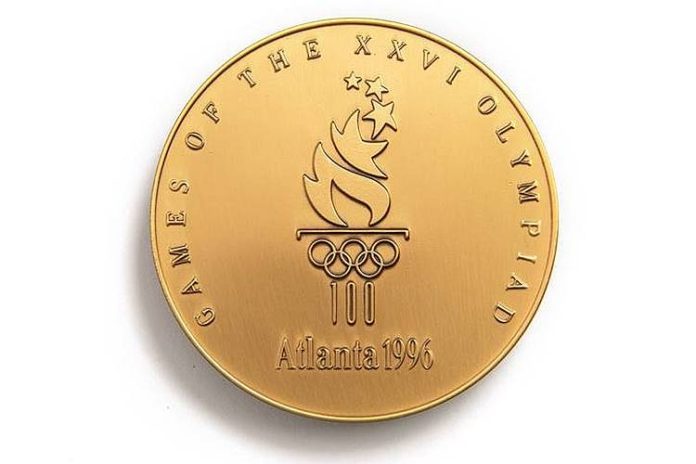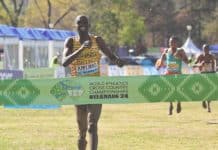
(For our Highlights of the weekend’s major competitions, click here)
● Plus: Russia: U.S. visited Griner on 19th; WADA confirms 17 more cases from Moscow Lab data opened in 2022 = Athletics: Canada’s Brown celebrates Birmingham triple-header and Bromell apologizes; Poland’s Lewandowski retires = Tennis: ATP joins WTA in removing Wimbledon ranking points ●
“The far-reaching political, social and economic consequences of the war make it a turning point in world history.”
That was International Olympic Committee President Thomas Bach (GER) from his speech to the 139th IOC Session last Friday, explaining and extending the IOC’s actions in banning events in Russia and Belarus and asking International Federations to remove Russian and Belarusian athletes from their events.
Asked how he sees the impact of the Russian war on Ukraine in practical terms during the follow-up news conference, Bach reflected on how the conflict has stopped – in an important way – the IOC in its tracks:
“When I say it’s a turning point in history, I think everybody agrees that the world will look different after this war, there will be a new world order and you see already developing a new world security order [with Finland and Sweden asking to join NATO].
“And we cannot ignore this.
“Our task is, whenever it comes to a political circumstances interfering in our mission, in our work, is to do everything we can to keep the Olympic Games, and to keep sport, beyond politics as much as possible.
“Then, we have to face these realities, and this is why we took the protective measures, and this is why are saying we are conscious of the fact – we regret the fact that at this moment in time – we can not live up to our mission. We cannot have this uniting power of a peaceful competition in sports. And this hurts, and on the other hand, encourages us to work even harder, and it encourages us also to hope even more that as soon as possible, peace will prevail.”
¶
The IOC Session was closed with an address by senior IOC member Richard Pound of Canada, who will become an Honorary Member at the end of 2022. Pound, one of the most important IOC members in history, led the IOC’s effort to market its television rights beginning after the 1984 Olympic Games in Los Angeles, was the founding President of the World Anti-Doping Agency and led the IOC’s inquiry into Russia’s state-sponsored doping program from 2011-15.
His speech covered the achievements of the 139th Session, which began before the start of the 2022 Beijing Winter Games in February and ended in mid-May. He particularly focused on the ultimate success of the Tokyo and Beijing Games, but also a needlessly missing element:
“The organization of Olympic Games is always a complicated challenge, from the very conception through to the delivery of each end of the Games under conditions that will provide Olympic athletes with the best opportunities to maximize their performances and it will allow presentation of the Games to be made to billions of Olympic spectators around the world, all at the levels that Olympic athletes and spectators have come to expect.
“Achieving such outcomes requires extraordinary coordinated efforts on the part of the organizers, the Olympic Family, supporters, rights-holding broadcasters, Olympic Broadcasting Services and everyone else, because as we all know, everything has to work perfectly, the first time.
“The Beijing and Tokyo Games both faced an additional and potentially existential threat in the form of the Covid-19 pandemic that appeared in early 2020 and continued to hang over both editions of the Games and frankly, which still remains with us. No one connected or affected by those Games will ever how the world worked together to ensure that the Games were successfully celebrated, with minimal risk to athletes and to the local populations.
“As IOC members, we should be proud of our leadership in the circumstances, which played a major role in my view in ensuring that the Games took place. …
“BOCOG considered the Covid-19 pandemic to be the major potential disruptor of the Beijing Games, but the system put in place, including the closed-loop and the playbooks, proved to be successful in minimizing the risks to both athletes and the Chinese population. The containment of the health risks was a major achievement in the circumstances, and we know – sadly – that their struggle with this in China continues. …
“With all that said, I must confess to a major personal disappointment with respect to both of the recent Games, and that is the refusal of the organizing committees to issue and distribute the traditional participation medals, principally to the participating athletes.
“Both OCOGs had an obligation in their respective Host City Contracts to do so. Most Olympic athletes do not win medals in the competitions, and none of the other participants, such as coaches and team officials, win anything.
“In what we describe as an athlete-centered experience, participation medals are an important recognition of having taken part in the most important sporting event in the world, and I simply do not understand why the OCOGs did not live up to their commitments.
“A computer-generated, paper certificate is no substitute for a participation medal.”
This is hardly the first time that an organizing committee has skipped out on a low-profile requirement; the Rio 2016 organizers were so poor at the end that it was the only organizing committee in the history of the modern Games not to file an Official Report!
Pound also expressed his view of the situation with the boxing and weightlifting federations, noting, “The Games are a central element of the Olympic brand, and the IOC has a duty to ensure that this brand is not weakened as a result of governance failure in any Olympic federation.”
Good advice from someone who knows.
Rich Perelman
Editor
(For a look at Olympic participation medals from 1896-2018, the U.S. Olympic & Paralympic Committee has a full gallery here).
≡ THE 5-RING CIRCUS ≡
● Russia ● “I can confirm that a consular officer visited Brittney Griner in detention yesterday, on Thursday, May 19th. The consular officer found her continuing to do as well as could be expected under these exceedingly challenging circumstances. But again, our message is a clear and simple one. We continue to insist that Russia allow consistent and timely consular access to all U.S. citizen detainees. One-off visits are not sufficient, and we will continue to call on Moscow to uphold its commitments under the Vienna Convention for consistent and timely access as well.”
That was U.S. State Department spokesman Ned Price on Friday, 20 May, on the continuing detainment of basketball star and twice Olympic gold medalist Brittney Griner, who was arrested on 17 February for allegedly carrying hashish oil into the country in a vape cartridge.
¶
The World Anti-Doping Agency reported last week that the analysis of the data obtained in 2019 from the infamous Moscow Laboratory Information Management System (LIMS) resulted in a total of 810 doping cases opened against Russian athletes, including 17 new cases this year.
Some of the cases are being pursued by WADA, but many have been distributed to the specific organizations servicing each International Federation.
● Athletics ● You never know what happens at a track meet, even a Diamond League meet. Just ask Canadian sprinter Aaron Brown about Saturday’s races in Birmingham (GBR):
“I’m glad I won this one and not the first [race] if I had to choose! I felt good. My plan today was to get a training day in. I have another race to run in the relay so three runs in one Diamond League is a record for me but I love it. I’m just trying to get the work in and get ready for the World Champs.
“Originally I was just coming to do the relay and then it just so happened I asked to get in the 100 and they only put me in the B race and then the A race opened up so I did all three and it paid off.”
Brown ran second in the 100 m B race in 10.23 into a 0.5 m/s headwind, but then won the Diamond League race in 10.13 (-0.2). He scored a second win in the men’s 4×100 m relay, leading off the winning foursome that timed 38.31.
How did he feel after the relay? “I was cramping up.”
Following his false start in the men’s 100 m that eliminated him from the race, American star Trayvon Bromell tweeted: “Send my apologies to everyone who had to watch that rookie mistake.”
Slovenian discus star Kristjan Ceh, the man of the meet, said afterwards he was surprised by his sensational 71.27 m (233-10) win:
“Well that was totally unexpected – to get a world lead, national record, meeting record and Diamond League record is amazing. In the warm-up, I wasn’t in great shape, I missed all my throws and they all went to the left, but once the competition started it all came together. The [windy] conditions were great today.”
¶
Polish middle-distance star Marcin Lewandowski, 34, announced his retirement last week on Instagram (translated from Polish):
“After my daughter’s accident during her rhythmic gymnastics class [just before the World Indoors], I decided to stay at home until Midia was fully recovered. Due to the fact I did not have the opportunity to train abroad, I was not able to prepare properly to defend my bronze medal from the World Championships and my silver from the European Championships and I am not interested in places outside the podium.
“Was it a difficult decision? I didn’t even think for a second because family is the priority. It was the same when I pulled out of the World Indoor Championships even though I was in great shape.
“It was a beautiful 16 years of running – an amazing adventure that is now over. Something ends and something begins because in November I will become a dad again.”
Lewandowski was European Champion in the 800 m in 2010 and the European Indoor champ in 2015 (800 m) and 2017 and 2019 in the 1,500 m. He was the World Indoor silver winner in the 1,500 m in 2018 and the Worlds 1,500 m bronze medal winner in 2019.
He finishes with bests of 1:43.72 from 2015 and 3:30.42 from 2021. A four-time Olympian, he had a best performance of sixth in the Rio 800 m final.
● Tennis ● The Association of Tennis Professionals (ATP) – the men’s professional tennis tour – also removed ranking points from this year’s Wimbledon tournament due to the banning of Russian and Belarusian players:
“The ability for players of any nationality to enter tournaments based on merit, and without discrimination, is fundamental to our Tour. The decision by Wimbledon to ban Russian and Belarusian players from competing in the UK this summer undermines this principle and the integrity of the ATP Ranking system. It is also inconsistent with our Rankings agreement. Absent a change in circumstances, it is with great regret and reluctance that we see no option but to remove ATP Ranking points from Wimbledon for 2022. …
“We greatly value our long-standing relationships with Wimbledon and the [Lawn Tennis Association] and do not underestimate the difficult decisions faced in responding to recent UK Government guidance. However, we note that this was informal guidance, not a mandate, which offered an alternative option that would have left the decision in the hands of individual players competing as neutral athletes through a signed declaration. Our internal discussions with affected players in fact led us to conclude this would have been a more agreeable option for the Tour. We remain hopeful of further discussions with Wimbledon leading to an acceptable outcome for all concerned. More broadly, we believe this matter again highlights the need for a united governance structure across professional tennis so that decisions of this nature can be made in a joint manner.”
And what about the devastation of Ukraine?
“Our condemnation of Russia’s devastating invasion of Ukraine remains unequivocal. Immediate action was taken to suspend the ATP Tour event in Moscow and have Russian and Belarusian athletes compete under neutral flags on Tour. In parallel, we have continued our humanitarian support for Ukraine, together with the other governing bodies of tennis, as well as providing direct financial assistance to many affected players.”
The ATP statement did differ with the approach of the Women’s Tennis Association on related tournaments:
“[W]e confirm that ranking points will remain at ATP Tour events at Queen’s (ATP 500), Eastbourne (ATP 250) and ATP Challenger events in the UK. We have taken this decision on the basis that alternative playing opportunities are open to Russian and Belarusian players in those weeks, unlike during Wimbledon, which minimises any impact on the integrity of the rankings. Sanctions related to LTA’s violation of ATP rules will be assessed separately.”
You can receive our exclusive TSX Report by e-mail by clicking here. You can also refer a friend by clicking here, and can donate here to keep this site going.
For our updated, 620-event International Sports Calendar for 2022 and beyond, by date and by sport, click here!



















